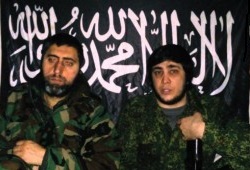
Dagestan’s Insurgency Carries out an Orderly Reorganization
Publication: Eurasia Daily Monitor Volume: 11 Issue: 204
By:

After the recent death of another leader of Dagestan’s Aukhov jamaat, the press service of the Dagestani Liberation Front posted a video recording of the address of the emir of the Northern Sector, Islam Abu Ibragim (a. k. a. Islam Ibragimov). The leader of Dagestan’s insurgents announced the appointment of Emir Khasmagomed (Khasmagomed Charanov) as the new leader of Aukhov jamaat (daymohk.net, November 11). The new emir is 40 years old and comes from the village of Oktyabrskoe in Dagestan. He likely joined the armed opposition when he was already of mature age. Indeed, as recently as 2009, Charanov still had legal status and owned a business in Dagestan’s Khasavyurt district, which borders Chechnya. Charanov’s buisness included a network of small shops that sold food and agricultural produce (oktyabrskoe.ks08q.ru, April 1, 2009).
The new emir possibly helped the militants in his district when he still had legal status. Charanov may have decided to join the illegal underground movement in Dagestan after a criminal investigation against him was launched in 2013. He was accused (samosud.org, October 31, 2013) of causing the death of one person and injuries to three others in a car crash (ndelo.ru, April 19, 2013). After a preliminary investigation, a court restricted Charanov’s movements and made his release conditional on good behavior. Soon after the court decision, Khasmagomed Charanov evaded justice and was declared a fugitive. He became the leader of the jamaat within a year of being declared a fugitive. The fact that he rose to become a major insurgent leader in the Dagestani militant movement in less than a year means he likely already had close ties to the insurgents before he became a fugitive.
The new leader of the Aukhov jamaat is an ethnic Avar who was originally from Tsumada district. He was among the Avars who were moved to the Chechen village of Oktyabrskoe in Dagestan’s Khasavyurt district, near the city of Khasavyurt. His appointment probably means that he has had good relations with the Chechens, given that the jamaat is predominantly Chechen. However, his appointment is unlikely to alleviate the tensions between the Aukhov Chechens and the emir of the Northern Sector, Islam Abu Ibragim. The borders of the jamaats have not been the only point of contention between the emirs in the district. The new emir of the Aukhov jamaat has a disability: he is missing his left palm. No information is available on what caused his disability and when it happened, or whether it was in battle or whether it occurred before he joined the Islamic underground in Dagestan.
In his video address, Islam Abu Ibragim, the emir of the Northern Sector also talked about the reticence of the enemy over its failures, overcoming small problems connected to the previous leader of the jamaat. He also reminded people about their obligation to pay zakat (tax according to sharia law) for the purposes of waging the gazavat (holy war) (youtube.com, November 9). He also outlined the territory for which the Aukhov jamaat has military jurisdiction, including the territories of Kazbekovsky, Novolaksky and part of Khasavyurt district along the Aksai River; the area of Zarechka, which is a Chechen-populated sector of the city of Khasavyurt; and the villages of Aksai, Batash, Oktyabrskoe and others, up to the village of Gerzel. The operational territorial limits of the Aukhov jamaat appear to coincide fully with the areas adjacent to Chechnya. Later in his address, Ibragim briefly mentioned that there were disputes with the previous emir of the jamaat over the exact borders of the jamaat. Apparently, the fact that there are three different jamaats in Khasavyurt district makes the issue of the borders between them especially sensitive as they must have conflicts with each from time to time. Until recently, the emir of the Northern Sector was also the emir of the Khasavyurt jamaat (kavkazcenter.com, September 30).
In his video message, Ibragim also responded to claims that the Aukhov jamaat does not help the families of those who died in battle. He insisted that the jamaat had helped the families and would do so in the future, at the same time noting in passing that everybody had to contribute zakat. This announcement may be a prologue to a new wave of expropriations of funds from businesses for the needs of the armed underground—precisely the channel of financing for the rebels that the authorities are putting the most effort into trying to block. Extorting businesses has also become popular among Dagestan’s criminals, who sometimes even pretend they represent the rebel movement (maxpark.com, November 18, 2012).
In his video address, the Dagestani rebel leader also mentions an armed clash that took place in the village of Oktyabrskoe, during which the rebels inflicted serious damage on Russian-backed government forces. Russian media have been silent about this incident. According to Ibragim, the security forces attempted to capture him and Emir Khasmagomed. By pure chance, all the militants in the area managed to escape without being harmed—which is why, Ibragim said, the Russians kept silent about the incident, (YouTube, November 9, after 2 minutes and 50 seconds). If this is true, it means Emir Islam Abu Ibragim escaped from a trap set for him by the Russians for the fourth time (see EDM, October 3).
The internal issues of the jamaats of the Northern Sector indicate that despite the fierce struggle with the Russian security services, the armed underground movement routinely carries out its reorganization in an orderly fashion. The movement also manages to resolve its internal issues through a process of deliberation and attempts to reach mutual consent with the help of the sector’s qadi (Muslim judge). No rash statements or moves are made, which indicates that the basis of the Dagestani armed underground still remains strong and may be becoming stronger and more dangerous than officials in Moscow imagine.




